
Fair Isle is an island in Shetland, in northern Scotland. It lies about halfway between mainland Shetland and Orkney. It is known for its bird observatory and a traditional style of knitting. The island has been owned by the National Trust for Scotland since 1954.

The Department of Health and Social Care (DHSC) is the UK government department responsible for government policy on health and adult social care matters in England, along with a few elements of the same matters which are not otherwise devolved to the Scottish Government, Welsh Government or Northern Ireland Executive. It oversees the English National Health Service (NHS). The department is led by the secretary of state for health and social care with three ministers of state and three parliamentary under-secretaries of state.
General practice is the name given in various nations, such as the United Kingdom, India, Australia, New Zealand and South Africa to the services provided by general practitioners. In some nations, such as the US, similar services may be described as family medicine or primary care. The term Primary Care in the UK may also include services provided by community pharmacy, optometrist, dental surgery and community hearing care providers. The balance of care between primary care and secondary care - which usually refers to hospital based services - varies from place to place, and with time. In many countries there are initiatives to move services out of hospitals into the community, in the expectation that this will save money and be more convenient.

The Great North Air Ambulance Service (GNAAS) is a registered charity based in the United Kingdom. It operates a dedicated helicopter emergency service for the North of England with three aircraft, serving North Yorkshire, the North-East, Cumbria and Scottish borders.
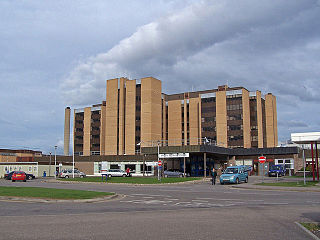
Raigmore Hospital is a health facility located in Inverness, Scotland. It serves patients from the local area as well as providing specialist services to patients from across the Highland area. It is a teaching hospital, educating a range of healthcare professionals in association with the Universities of Aberdeen and Stirling. It is managed by NHS Highland.
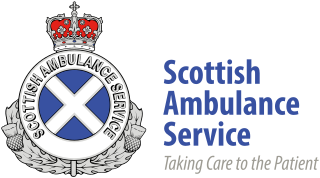
The Scottish Ambulance Service is part of NHS Scotland, which serves all of Scotland's population. The Scottish Ambulance Service is governed by a special health board and is funded directly by the Health and Social Care Directorates of the Scottish Government.

NHS Scotland, sometimes styled NHSScotland, is the publicly funded healthcare system in Scotland, and one of the four systems which make up the National Health Service in the United Kingdom. It operates fourteen territorial NHS boards across Scotland, seven special non-geographic health boards and NHS Health Scotland.
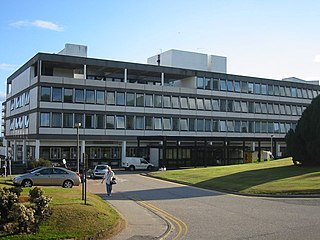
Aberdeen Royal Infirmary (ARI) is the largest hospital in the Grampian area, located on the Foresterhill site in Aberdeen, Scotland. ARI is a teaching hospital with around 900 inpatient beds, offering tertiary care for a population of over 600,000 across the North of Scotland. It offers all medical specialities with the exception of heart and liver transplants. It is managed by NHS Grampian.
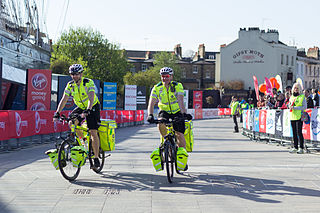
St John Ambulance is a volunteer-led, charitable non-governmental organisation dedicated to the teaching and practice of first aid and the support of the national emergency response system in England. Along with St John Ambulance Cymru, St John Ambulance Northern Ireland, and St John Scotland, it is one of four United Kingdom affiliates of the international St John Ambulance movement.

Emergency medical services in the United Kingdom provide emergency care to people with acute illness or injury and are predominantly provided free at the point of use by the four National Health Services (NHS) of England, Scotland, Wales, and Northern Ireland. Emergency care including ambulance and emergency department treatment is only free to UK residents and a charge may be made to those not entitled to free NHS care. The NHS commissions most emergency medical services through the 14 NHS organisations with ambulance responsibility across the UK.

Emergency medical personnel in the United Kingdom are people engaged in the provision of emergency medical services. This includes paramedics, emergency medical technicians and emergency care assistants. 'Paramedic' is a protected title, strictly regulated by the Health and Care Professions Council, although there is tendency for the public to use this term when referring to any member of ambulance staff.
Air ambulance services in the United Kingdom provide emergency medical functions, patient transport between specialist centres, or medical repatriation. Services are provided by a mixture of organisations, operating either helicopters or fixed-wing aircraft. All emergency air ambulance helicopters in England, Wales, and Northern Ireland are operated by charities, while Scotland has one charity service in addition to its two NHS-funded helicopters. Fixed-wing air ambulances, used for patient transport, may be government or privately operated.
Healthcare in the United Kingdom is a devolved matter, with England, Northern Ireland, Scotland and Wales each having their own systems of publicly funded healthcare, funded by and accountable to separate governments and parliaments, together with smaller private sector and voluntary provision. As a result of each country having different policies and priorities, a variety of differences have developed between these systems since devolution.

The British Association for Immediate Care (BASICS) is an organisation which has the stated aim to encourage and aid the formation and extension of immediate care schemes. The British Association for Immediate Care was founded as a charity in 1977 and combines bringing people together who have an interest in pre-hospital immediate care with supporting and promoting regional and local immediate care schemes across the UK.

University Hospital Wishaw is a district general hospital in Wishaw, North Lanarkshire, situated between the areas of Craigneuk to the north and Netherton to the south. The hospital, managed by NHS Lanarkshire, is 11 miles southeast of Glasgow.
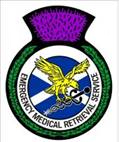
The Emergency Medical Retrieval Service (EMRS) provides aeromedical critical care to people in Scotland. It provides patients in remote and rural areas with rapid access to the skills of a consultant in emergency medicine, intensive care medicine, or anaesthesia, and facilitates transfers to larger, better equipped city hospitals.

A blood bike is a motorcycle used to courier urgent and emergency medical items including blood, X-rays, samples, drugs, and documentation between hospitals and other healthcare facilities.
Waheed Arian is a British doctor and radiologist, born in Afghanistan, who founded a telemedicine charity called Arian Teleheal. The charity enables doctors in conflict zones and low-resource countries to use their smartphones to receive advice from volunteer specialists in the UK, Canada, the US and other countries. Arian has won several international awards for his achievements, and regularly speaks as an expert in innovation, technology and global health.

Operation Rescript is the code name for the British military operation to help tackle the ongoing COVID-19 pandemic in the United Kingdom and its Crown Dependencies. It has been described as the UK's "biggest ever homeland military operation in peacetime" by the Ministry of Defence (MOD), involving up to 23,000 personnel within a specialist task force, named the COVID Support Force (CSF). The support is given at the request of the UK government, its devolved administrations and civil authorities through the Military aid to the civil authorities (MACA) mechanism.

The Prehospital Immediate Care and Trauma (PICT) Team is a prehospital care team which operates from Raigmore Hospital emergency department in Inverness, Scotland. It receives funding from NHS Highland, BASICS Scotland and the Scottish Trauma Network. They are a stand-alone enhanced care team responding to trauma and other critical care incidents in Inverness and the Northwest Highlands, utilising a rapid response car. PICT comprises either a senior doctor from Raigmore Hospital or a local GP, together with a Scottish Ambulance Service advanced rural practitioner. In light of the sparsely distributed ambulance resources in the Highlands and the challenges of distance and weather in the north west of Scotland, PICT has a considerable remit beyond trauma. PICT provides support to ambulance crews and community responders in medical emergencies, and also provides a “see and treat” service to patients in order to prevent transport and possible hospital admission for problems manageable at home. In this way PICT acts as a senior decision maker for prehospital clinicians across the North of Scotland.
















